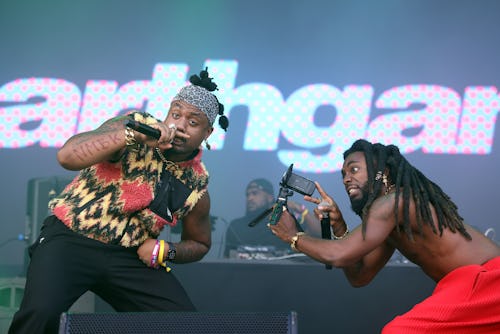EARTHGANG’s new album tackles spirituality, survival, and the fallacies of social media
GHETTO GODS is a sprawling opus that, even when it stumbles, still makes clear what the duo really cares about.

“The South has something to say,” remains one of the most prescient and quietly assured moments in music history. Andre 3000 raised his voice at The Source Awards in 1995, and everyone followed it all the way back to Atlanta, where tradition and literature had historically coalesced to lead people home. And yet when it came to the music defining 90s pop culture, the city had stood in the unusual spot of the underdog. Atlanta-born and bred artists Johnny Venus and WowGr8, better known as EARTHGANG, are reaping the providence of those that grabbed the mic and staked a claim in the hip-hop pantheon. After several years of false starts and missed dates, they have released their latest album, Ghetto Gods, to high fanfare and gracious relief. Coming in at 17 tracks, five of them interludes, the album is a sprawling opus that expands on the musical leanings of its creators, even when it stumbles to fully reconcile the larger themes it dares to address.
The album’s title track comes after a 2 Chainz interlude titled “GLOW” that acts as a team mantra before the beginning of a big game. Both singles straddle the line between bravado and humility, while rejecting the insecurity projected onto Black dreams by those with thin imaginations. “I turned a mustard seed into a million/end of discussion” raps Johnny Venus, setting the tone for a brief meditation on gratitude. WowGr8 comes in with one of the most memorable lines on the album, stating, “Look at the stars/Look at the sky at night/Tell me that heaven ain’t Black.” The afterlife is approached with ecstasy and reverence, embraced as a place that has room for those often cast aside on Earth. Religion or at least spiritual rituals are topics EARTHGANG has mulled over on numerous accounts including on the trippy and psychedelic “Up,” released in 2019. But on “Ghetto Gods” there is a subtle shift that grounds the lyrics in stories passed across generations, giving the song a pathos that’s deeply personal and tenderly hopeful.
“AMERICAN HORROR STORY” is world history mixed with anecdotal musings on survival, and it asks questions about that space between coming up and leaving people behind. It makes no conclusions, and instead compels listeners to draw from it whatever they can and make their own way. “WATERBOYZ” introduces the heavyweights from the Dreamville roster, including J. Cole himself, who makes an unexpected appearance towards the end of the song. But it’s JID who takes off, moving between tempos and cadence to deliver a standout feature that rides over the melody of old-school R&B and the steady bass of contemporary hip-hop.
As Ghetto Gods progresses, a few tracks start to bog down the album with bloated statements on themes that require greater nuance. The beginning of “LIE TO ME” seems promising, as it dives into the fallacies in online identities and makes hardened observations on the ease with which money falls through our fingers. But while WowGr8’s mellow delivery complements his teammate, his lyrics suggest a skewed understanding of the social currency that comes from the desirability politics he is mocking. The self-righteous outrage exhibited on lines like “She just wanna take dick, she just wanna take pics/… I'm talkin' 'bout think, she talkin' 'bout minks,” undercut the valid inquiries made earlier about authenticity versus performance. In an era of grifters as influencers, it’s easy to conflate self-promotion with predatory narcissism. But it’s necessary to make the distinction so villains aren’t just women who know how to turn lustful desire into cash.
“Black Pearls” takes itself too seriously even with the addition of Baby Tate’s punchy verse that feels like banter between friends. “Power” lands like a didactic manifesto with concepts on Black prosperity that rest on the very hierarchies that brutalize the most vulnerable, and “Billi” loses itself in dreams of hoarded wealth that fail to align with the community ethos present in prior songs. These missteps articulate the very delicate position that visible Black creators find themselves in where community is paramount, but individual aspirations for success and greatness simultaneously cloud the ways we see and fight for those we hold close.
In the last half of the album, the spoken word artist Lynae Vanee and rapper JT add moments of dexterity and spark with their interludes, and on “Amen” featuring Musiq Soulchild, EARTHGANG invokes religious practice as proof of abiding love. The closing track “RUN TOO” calls on Ari Lennox to be the evocative narrator seeking solace in the midst of endless loss. “Ooh, what a life, what a life, what a life, what a life this is/Who can I, who can I open up to?” she sings as Johnny Venus and WowGr8 rail against forces that make it unbearable to live. “I’m tired of crackers, I’m tired of dealin’ wit’ you racist bastards/Salty asses, can’t focus on nothin’ else but me,” spits Venus. It’s a quietly devastating song to close off an album, and it’s as if the rappers know that with all the success that comes from dogged ambition, some things are just too bleak to be sung away.
When it comes to duos who can go toe to toe with the other’s skill, EARTHGANG at their best, follow in the wake of Outkast, Malik B. and Black Thought, Pimp C and Bun B in how electric their lyrics feel as they trade bars back and forth. In a recent interview they called Ghetto Gods “the most complete and succinct album we’ve had,” and this is evident in both the storytelling and the collaborators chosen. Art thrives in community, and on Ghetto Gods the duo has curated a project that utilizes cornerstones of Black art to make pointed observations colored in humor and poetry, and ultimately threaded together through music.